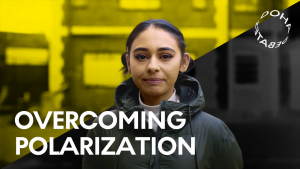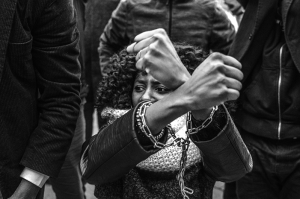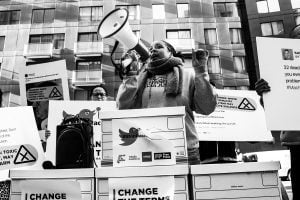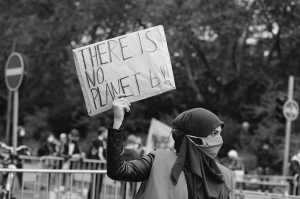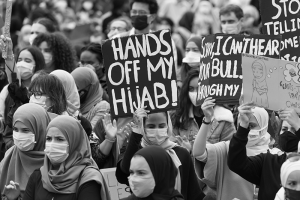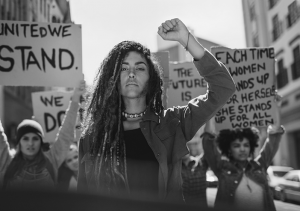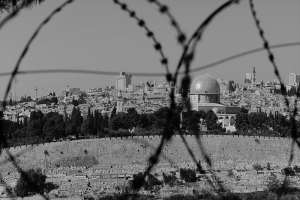
Course Correction (Season 2)
In the second season of Course Correction, host Nelufar Hedayat is taking on a new challenge: Listening to people she disagrees with. Each episode addresses one polarizing issue, and Nelufar will engage with people whose opinions are very different from her own — and try to keep an open mind. Nelufar will challenge her own beliefs with discussions about race and reparations, COVID-19 policy, gender rights and religion, and so much more.
01. Overcoming Polarization
Overcoming polarization
Disagreement can be good — even healthy — but polarization is not that. Polarization on social media has inflamed cancel culture, conspiracy theories and disinformation on a global scale. Polarization adds friction to already heated topics like climate change and gun control, dividing communities and seeding defensiveness and distrust. Doha Debates host Nelufar Hedayat explains how polarization came to be, and how we might be able to overcome these divides.
This lesson plan accompanies the Overcoming Polarization video and explores how dividing into opposing groups impacts our ability to problem-solve and move forward. Consider using these activities to understand polarization and to prepare for one of the topic-specific episodes of Season 2 of the Course Correction podcast.
Full lesson plan for educators: Overcoming Polarization
02. Reparations: Can we right historical wrongs?
Reparations: Can we right historical wrongs?
Nelufar looks at cases demanding reparations for past injustices in the U.K., Zimbabwe and the U.S. She speaks to Glenda Caesar, a victim of the Windrush scandal involving people who immigrated to the U.K. from former British colonies. She then takes on a challenging interview with Masimba Musodza from Zimbabwe, who has very different views than Nelufar about reparations in his country. Finally, she speaks to Dr. Ron Daniels of the National African American Reparations Commission in the U.S.
Listen to the podcast for a deep dive into these essential questions:
- Why is the subject of reparations so controversial?
- How can examining and comparing different cases of past injustices rooted in colonial history around the world help us understand the systemic nature of racial discrimination?
- Can a clearer understanding of the damage done by institutional racism help us to design appropriate reparations and envision how they could correct course in the future?
Full lesson plan for educators: Reparations: Can we right historic wrongs?
03. Can "cancel culture" go too far?
Can "cancel culture" go too far?
Nelufar gets personal about the issue of cancel culture, having experienced it herself. She explores the evolution of this social media phenomenon in conversations with rogue British journalists Suzanne Moore and Julie Bindel, who talk about their supposed cancelation for “gender critical” views as feminists. Nelufar then turns to author and activist Sonya Renee Taylor and linguist Isobelle Clarke for a deeper look at the language of cancelation, as well as where to draw the line between raising awareness and the punitive nature of cancelation.
Listen to the podcast for a deep dive into these essential questions:
- How can a broad review of the evolution of cancel culture over time help us to understand its significance and put it into perspective?
- Is the effect of cancel culture on celebrities and important public figures comparable to its impact on regular people?
- Who are all of the stakeholders in the cancel culture arena?
- How could skills from Better Conversations apply to polarized online situations to mitigate being canceled?
Full lesson plan for educators: Can “cancel culture” go too far?
04. How alarmist should we be about climate change?
How alarmist should we be about climate change?
Nelufar covers the full spectrum of experts in her quest to pinpoint why not everyone is on board with combating climate change. She talks to Norwegian psychologist Per Espen Stoknes about reframing the language we use to talk about climate change. Then she interviews Daniel Shrag, professor of environmental science at Harvard, who talks about the dollars and cents of convincing people. He also raises the alarm about the profound economic shift away from fossil fuels that will be necessary. Finally, Nelufar speaks with former Australian Prime Minister Julia Gillard, who offers sage reflection on the carbon tax law that was passed under her administration but then ultimately repealed.
Listen to the podcast for a deep dive into these essential questions:
- What can we learn by examining the way we talk about climate change?
- How important is individual action when it comes to climate change?
- Do the biggest contributors to the climate crisis have a moral obligation to lead the world in decarbonization?
- How do policy efforts aimed at combating climate change stack up against other historic political changes?
Full lesson plan for educators: How alarmist should we be about climate change?
05. Does French secularism promote freedom or stoke Islamophobia?
Does French secularism promote freedom or stoke Islamophobia?
Nelufar, a Muslim woman, stays true to her own convictions regarding women’s choices about what they wear while trying to find some common ground with French lawmaker Aurore Bergé, who opposes forcing minors to wear the hijab (headscarf). Nelufar also introduces listeners to documentary filmmaker Deeyah Khan, a fellow Muslim and feminist, who speaks passionately against men dictating what women do with their bodies, the real roots of extremism in Europe and the need for leadership and unity.
Listen to the podcast for a deep dive into these essential questions:
- Is wearing a hijab consistent with feminism and women’s equality?
- Why is it important to understand Muslim women’s choices when it comes to wearing a hijab?
- Should governments regulate what people wear in any circumstance?
- How do we draw the line between freedom of religion, women’s rights and national security?
Full lesson plan for educators: Does French secularism promote freedom or stoke Islamophobia?
06. Masculinity, feminism and the fight for gender equality
Masculinity, feminism and the fight for gender equality
Nelufar explores whether men should have a role in feminism. She talks first to British comedian and football enthusiast David Baddiel for an honest opinion from this icon of “lad culture.” She then turns to French feminist Pauline Harmange, who doesn’t think men should have any say in the feminist cause. Finally, she gathers a panel — or “manel”— of men from different points and cultures around the globe to debate and share their perspectives.
Listen to the podcast for a deep dive into these essential questions:
- Should men have an active role in the feminist movement? Why or why not?
- Is there a distinction to be made between feminism and gender equality?
- Who are the stakeholders in the feminist movement?
- How can gender equality be analyzed systemically?
Full lesson plan for educators: Masculinity, feminism and the fight for gender equality
07. Palestine, Israel and the courage of dialogue
Palestine, Israel and the courage of dialogue
Nelufar takes on the long-standing conflict between Israel and Palestine just as the region flares up again, adding intensity to her guests’ views and challenging her as a journalist. She introduces listeners to three diverse and moving viewpoints: rapper Tamer Nafar talks about the languages of antisemitism and Islamophobia as well as inequity and coexistence; conflict negotiation specialist Hussein Agha makes a strong case for when dialogue must turn to action; while peace activist Robi Damelin talks about the work of honoring parallel narratives from victims on both sides as a bridge to building empathy and trust.
Listen to the podcast for a deep dive into these essential questions:
- Why is it essential to examine the Israeli–Palestinian conflict in historical context?
- Can making space to listen and understand both sides of the story lead to productive dialogue toward peace?
- What parallels can we draw with other conflicts to deepen our understanding of this one?
- Is it possible to build trust between enemies?
Full lesson plan for educators: Palestine, Israel and the courage of dialogue
